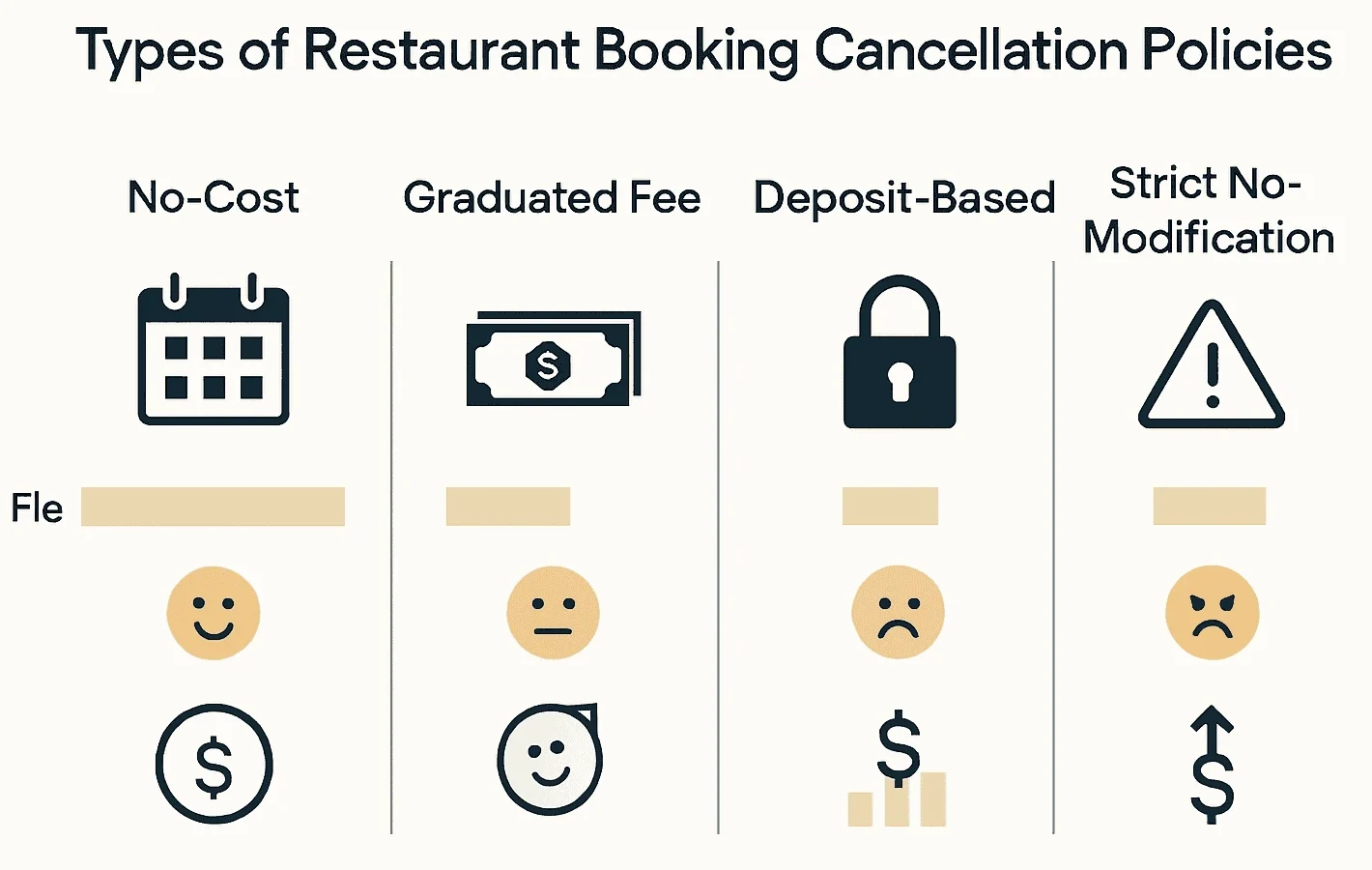Restaurant Booking Cancellation Policies Explained
Restaurants lose as much as 25 percent of peak-time revenue due to no-shows, making effective cancellation policies more than just a formality. Clear guidelines help restaurants manage unpredictable bookings and protect vital income, while also shaping the guest experience. Understanding how these policies work can help both owners and diners avoid confusion, reduce conflicts, and build stronger, more reliable relationships on both sides of the reservation.
Key Takeaways
Point | Details |
|---|---|
Cancellation policies
| Clear, explicit cancellation policies help mitigate no-show risks and protect restaurant revenues. |
Tailored policy types
| Different cancellation strategies, such as no-cost or deposit-based policies, should be tailored to restaurant needs and customer expectations. |
Effective communication | Proactive communication, including reminders and transparent fee structures, is critical for reducing no-show rates and ensuring guest satisfaction. |
Legal compliance | Understanding and adhering to local consumer protection laws is vital for developing effective and legally compliant cancellation policies. |
Defining restaurant booking cancellation policies
Restaurant booking cancellation policies are structured guidelines that define how establishments handle reservation changes, cancellations, and any related financial implications. According to researchwith.montclair.edu, these policies play a crucial role in reducing no-show risks and managing booking uncertainties. A well-crafted cancellation policy clearly specifies when and how guests can modify or cancel their reservations without incurring charges, ensuring transparency and fairness for both the restaurant and its customers.These policies might include timeframes for free cancellation, graduated fee structures based on proximity to reservation time, and specific conditions that trigger different levels of charges. Key components of effective restaurant booking cancellation policies often include:
Precise cancellation windows (e.g., 24 or 48 hours before reservation)
Graduated fee structures reflecting reservation size
Clear communication channels for cancellations
Consistent application across all booking platforms

Effective cancellation policies ultimately serve dual purposes: protecting the restaurant’s financial interests while maintaining customer goodwill. Top Tips for Restaurant Confirmation Emails can provide additional strategies for communicating these policies transparently to guests, ensuring mutual understanding and reducing potential conflicts.
Key types and policy variations explained
Restaurant cancellation policies are not one-size-fits-all strategies but nuanced approaches tailored to each restaurant’s specific needs. They involve a range of policy variations that help establishments protect their operations, manage reservations effectively, and maintain a healthy balance between guest flexibility and business stability, cancellation policy types can be broadly categorized into several distinct approaches. Here’s a comparison of common restaurant cancellation policy types and their key characteristics:
No-cost cancellation policies: Allows free reservation modifications within a specific timeframe
Graduated fee structures: Charges increase proportionally as reservation time approaches
Deposit-based policies: Requires upfront payment to secure reservation
Strict no-modification policies: Minimal flexibility with potential full-charge penalties

These policy variations serve different strategic purposes. Deposit-based policies, for instance, provide stronger financial protection against no-shows, while graduated fee structures offer customers some flexibility while still mitigating potential revenue losses. The key is finding a balance that protects the restaurant’s interests without alienating potential guests. Restaurants must also consider factors like party size, peak dining periods, and historical no-show rates when designing their cancellation frameworks. A small cafe might implement more lenient policies compared to a high-end restaurant with limited seating and significant opportunity costs for unfilled tables. By carefully crafting these policies, establishments can effectively manage booking uncertainties while maintaining customer satisfaction.
Legal and industry standards worldwide
Restaurant cancellation policies are subject to complex legal frameworks that vary significantly across different jurisdictions. legalclarity.org highlights the critical importance of understanding local consumer protection laws when developing reservation cancellation strategies that remain both legally compliant and commercially viable. Research from arxiv.org reveals that global legal standards for cancellation policies are increasingly focusing on transparency and consumer rights. Key international considerations typically include:
Clear disclosure of cancellation terms before transaction
Proportional financial penalties
Reasonable cancellation windows
Protection against arbitrary or excessive charges
Consistent application of policy across different booking channels
The legal landscape for restaurant cancellation policies is fundamentally about balancing business interests with consumer protections. While specific regulations differ between countries, there are emerging global trends towards standardization. Most jurisdictions now require businesses to provide unambiguous information about potential fees, ensuring customers can make informed decisions before making reservations. Understanding these nuanced legal standards requires restaurants to stay continuously informed about local and international regulations. This might involve consulting legal experts, regularly reviewing policy language, and maintaining flexible systems that can adapt to changing legal requirements across different markets. The goal is creating a fair, transparent approach that protects both the restaurant’s operational integrity and the customer’s right to reasonable service terms.
Best practices to minimize no-shows
Reducing no-show rates is critical for restaurant financial stability, research reveals that strategic reservation management can significantly decrease unexpected revenue losses, with some establishments reporting up to 30% reduction in no-show incidents through proactive techniques, effective no-show prevention strategies encompass multiple approaches:
Implementing automated confirmation calls
Requiring minimal reservation deposits
Sending timely SMS and email reminders
Creating flexible rebooking options
Establishing clear cancellation consequences
Technology plays a pivotal role in minimizing no-shows. Optimising your table turnover with an online reservation system can provide restaurants with sophisticated tools to track and manage potential no-show risks. Advanced reservation platforms now offer features like automatic reminder sequences, which can reduce no-show rates by sending strategically timed communications that keep reservations top of mind for guests. Successful no-show prevention is ultimately about creating a balance between customer convenience and operational protection. This means designing policies that feel fair and supportive, rather than punitive. By combining clear communication, technological tools, and customer-friendly approaches, restaurants can transform no-show challenges into opportunities for improved guest relationships and more predictable revenue streams.
Take control of your restaurant booking cancellations with Tableo
Struggling with no-shows and unclear cancellation policies can hurt your restaurant’s efficiency and revenue. This article explains how clear rules, flexible fees, and upfront deposits can reduce no-shows while maintaining positive guest relationships. Tableo’s all-in-one reservation management system offers seamless integration of digital floor plans, custom booking forms, and automated email/SMS reminders that make cancelling or modifying bookings straightforward for guests yet secure for your business. With features like deposit collection and AI-assisted guest messaging, you can confidently reduce last-minute cancellations and improve no-show rates.
Frequently asked questions
Restaurant booking cancellation policies are guidelines that outline how restaurants manage reservation modifications, cancellations, and any associated financial consequences. They help mitigate no-show risks and provide clarity for both the restaurant and the customer.
Restaurants commonly use several types of cancellation policies including no-cost cancellation, graduated fee structures, deposit-based policies, and strict no-modification policies. Each type has varying levels of flexibility and financial impact on customers.
Restaurants can effectively communicate their cancellation policies by sending proactive confirmation reminders, providing clear information about potential charges, offering flexible rebooking options, and ensuring transparency with fee structures to enhance guest engagement.

Unlock the tips that will help you stand out from the crowd and get more bookings!

Learn how to save time, reduce stress and fill your restaurant while you sleep!









